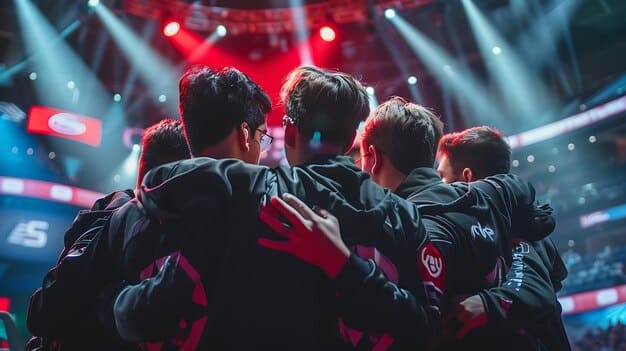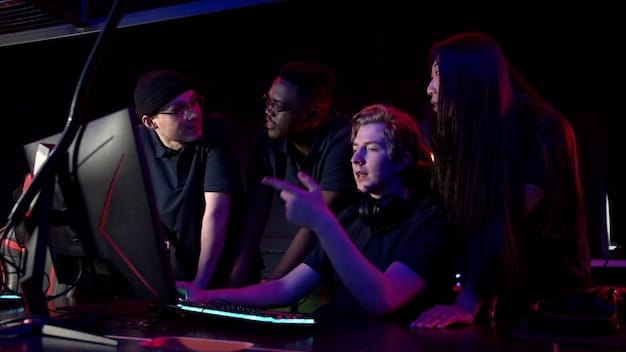US Collegiate Esports 2025: Top Universities to Watch

US Collegiate Esports is rapidly evolving, and in 2025, several universities are poised to lead the charge through strong programs, skilled players, and strategic investments in facilities and resources.
The world of competitive gaming is exploding, and US collegiate esports is at the forefront. Which universities are leading the way in 2025? Let’s dive in and explore the top contenders in US Collegiate Esports.
The Rise of Collegiate Esports in the US
Collegiate esports has surged in popularity over the past few years, transforming from a niche hobby into a recognized and respected competitive arena. US universities are increasingly investing in esports programs, offering scholarships, state-of-the-art facilities, and dedicated coaching staff.
This growth isn’t just about gaming; it’s about fostering teamwork, strategy, and discipline – skills that translate well into various academic and professional fields. As we look towards 2025, several institutions are setting the standard for what it means to be a top-tier collegiate esports program.
Factors Driving Collegiate Esports Growth
- Increased Sponsorship and Funding: Major brands are recognizing the marketing potential of collegiate esports, pouring money into sponsorships and infrastructure development.
- Growing Student Interest: Esports clubs and teams are attracting a significant portion of the student population, creating a vibrant community around competitive gaming.
- Professional Pathways: Collegiate esports provides a stepping stone for aspiring professional gamers, offering a platform to showcase their skills and gain valuable experience.
The expanding ecosystem of collegiate esports is creating new opportunities for students, universities, and the broader gaming community. The coming years promise even greater innovation and growth, as more institutions recognize the value of investing in these programs.

Top Universities in US Collegiate Esports
Identifying the leading universities in US collegiate esports requires a close look at their program structure, competitive performance, and overall commitment to supporting their esports teams. These institutions often have dedicated arenas, coaching staff, and recruitment strategies to attract top talent.
Several universities have consistently demonstrated excellence in various esports titles, making them the frontrunners in the collegiate scene. Their success stems from a combination of institutional support, talented players, and a thriving gaming community on campus.
University of California, Irvine (UCI)
UCI is often cited as a pioneer in collegiate esports, boasting a dedicated esports arena and a comprehensive program that supports multiple teams across various game titles. Their consistent success in competitions and strong community engagement make them a top contender.
UCI’s esports program includes scholarships, coaching, and access to state-of-the-art equipment, ensuring that their players have the resources they need to excel. Their proactive approach to building a supportive ecosystem has solidified their position as a leader in collegiate esports.
Boise State University
Boise State has rapidly risen to prominence in the collegiate esports scene, thanks to their impressive facilities, dedicated coaching staff, and strategic recruitment efforts. Their teams consistently perform well in national competitions, showcasing their commitment to excellence.
Boise State’s program focuses on both skill development and academic achievement, providing a well-rounded experience for their esports athletes. Their investment in esports has paid off, positioning them as a university to watch in the coming years.
Program Infrastructure and Facilities
A university’s esports program infrastructure and facilities play a crucial role in its success. Dedicated arenas, high-performance gaming PCs, and comfortable practice spaces can significantly enhance a team’s performance and attract top talent.
Institutions that prioritize these resources often see a marked improvement in their esports programs. The investment signals a commitment to supporting their athletes and fostering a competitive environment conducive to growth.
The Importance of Gaming Arenas
- Enhanced Training Environment: Dedicated arenas provide a professional and distraction-free environment for teams to practice and compete.
- Recruitment Advantage: State-of-the-art facilities can be a major draw for prospective esports athletes, helping universities attract top talent.
- Community Building: Arenas often host esports events and tournaments, fostering a sense of community among students and fans.
The quality of a university’s esports facilities can significantly impact its ability to compete at the highest level. Institutions that recognize this and invest accordingly are more likely to see success in the collegiate esports arena. Top-tier facilities not only improve performance but also boost morale and attract new talent, solidifying a university’s position in the esports landscape.
Scholarships and Support Systems
Scholarships and robust support systems are vital components of a successful collegiate esports program. Offering financial assistance can attract talented players who might otherwise be unable to afford tuition, while comprehensive support systems ensure that athletes have the resources they need to thrive both academically and competitively.
Universities that prioritize these aspects often create more sustainable and competitive esports programs. By investing in their athletes’ futures, these institutions foster a culture of excellence that extends beyond the gaming arena.
Academic Support for Esports Athletes
Balancing academic responsibilities with the demands of competitive gaming can be challenging. Universities that provide academic support services, such as tutoring and time management workshops, help ensure that their esports athletes succeed in the classroom.
This holistic approach not only benefits the students but also enhances the university’s reputation. By demonstrating a commitment to academic excellence, institutions can attract a more diverse and well-rounded group of esports athletes.

Coaching and Strategic Leadership
Effective coaching and strategic leadership are essential for the success of any collegiate esports team. Experienced coaches can provide valuable guidance on strategy, teamwork, and skill development, helping players reach their full potential.
Universities that invest in experienced coaching staff often see a marked improvement in their teams’ performance. Strategic leadership also plays a crucial role in building a sustainable esports program that can compete at the highest level.
Building a Winning Esports Strategy
- Team Composition: Coaches must carefully select players with complementary skills and personalities to create a cohesive and effective team.
- Strategic Analysis: Coaches must analyze opponents’ strategies and develop counter-strategies to gain a competitive edge.
- Performance Management: Coaches must monitor players’ performance and provide feedback to help them improve their skills and teamwork.
The combination of skilled coaching and strategic leadership can transform a group of talented players into a championship-winning team. Universities that prioritize these aspects are more likely to achieve long-term success in the competitive esports arena.
The Future of US Collegiate Esports
Looking ahead to 2025, the future of US collegiate esports appears bright. As the industry continues to grow and evolve, more universities are expected to invest in esports programs, creating new opportunities for students and athletes.
The increasing recognition of esports as a legitimate competitive activity will likely lead to greater funding, improved facilities, and more comprehensive support systems for collegiate esports teams. This trend promises to elevate the entire collegiate esports landscape, driving innovation and competition to new heights.
Potential Developments in Collegiate Esports
Several key developments could shape the future of US collegiate esports in the coming years. These include:
- Increased Scholarship Opportunities: More universities may offer esports scholarships to attract top talent, making collegiate esports more accessible to a wider range of students.
- Professionalization of Coaching: Coaching roles may become more professionalized, with universities hiring experienced esports coaches on a full-time basis.
- Expansion of Game Titles: Collegiate esports programs may expand to include a wider range of game titles, catering to diverse interests and skill sets.
The ongoing evolution of collegiate esports will create new challenges and opportunities for universities, athletes, and the industry as a whole. Those who are prepared to adapt and innovate will be best positioned to thrive in this dynamic and rapidly growing field.
| Key Point | Brief Description |
|---|---|
| 🏆 Top Universities | UCI and Boise State lead with robust esports programs. |
| 🏢 Infrastructure | Dedicated arenas enhance training and recruitment. |
| 💰 Scholarships | Financial aid attracts talented esports athletes. |
| 🧑🏫 Coaching | Experienced coaches drive strategic team development. |
Frequently Asked Questions (FAQ)
▼
The University of California, Irvine (UCI) and Boise State University are consistently ranked among the top US universities for esports due to their dedicated facilities and strong support systems.
▼
Esports scholarships can vary, covering tuition, housing, and other expenses. They are often performance-based and require athletes to maintain good academic standing to remain eligible.
▼
Facilities like dedicated gaming arenas are crucial. They offer an optimized training environment, attract recruits, and build community through events and tournaments.
▼
Coaches provide strategic insights, improve teamwork, and enhance individual player skills. Their expertise is vital for developing and maintaining competitive esports teams within universities.
▼
The future of US collegiate esports looks promising, with increased investment, professionalization and broader game title representation on the horizon, fostering more opportunity for student-athletes.
Conclusion
As we look towards 2025, it’s clear that US collegiate esports is poised for continued growth and innovation. Universities that invest in comprehensive programs, state-of-the-art facilities, and talented coaching staff will be the ones to watch in the competitive gaming arena.





